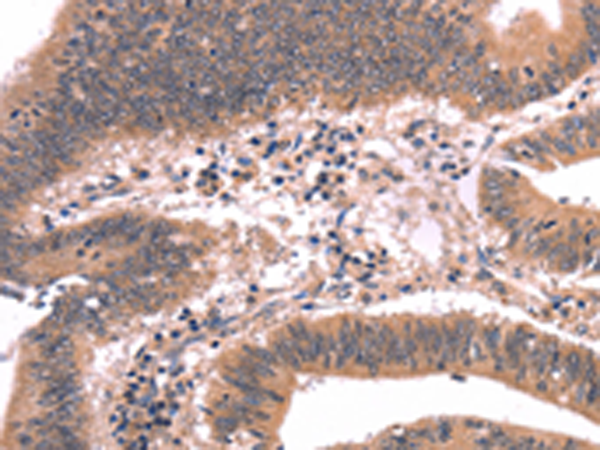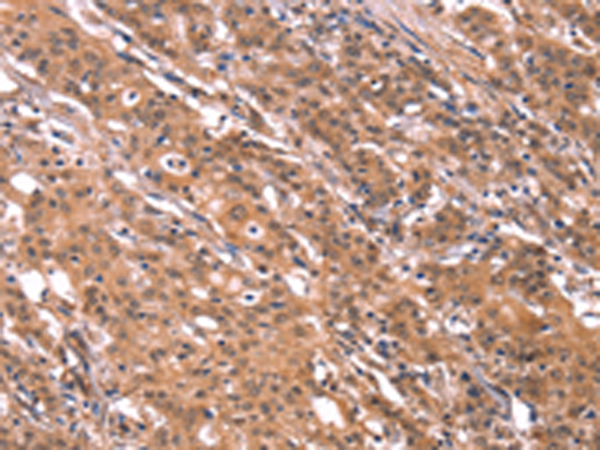

| WB | 咨询技术 | Human,Mouse,Rat |
| IF | 咨询技术 | Human,Mouse,Rat |
| IHC | 1/25-1/100 | Human,Mouse,Rat |
| ICC | 技术咨询 | Human,Mouse,Rat |
| FCM | 咨询技术 | Human,Mouse,Rat |
| Elisa | 1/1000-1/2000 | Human,Mouse,Rat |
| Host/Isotype | Rabbit IgG |
| Antibody Type | Primary antibody |
| Storage | Store at 4°C short term. Aliquot and store at -20°C long term. Avoid freeze/thaw cycles. |
| Species Reactivity | Human, Mouse |
| Immunogen | Synthetic peptide of human FGF22 |
| Formulation | Purified antibody in PBS with 0.05% sodium azide and 50% glycerol. |
+ +
以下是关于FGF22抗体的3篇参考文献及其摘要内容:
1. **文献名称**:*"Fibroblast growth factor 22 regulates synaptic plasticity in the hippocampus"*
**作者**:Umemiya, T., Takei, N., & Nawa, H.
**摘要**:研究利用FGF22抗体揭示FGF22在海马区突触可塑性中的作用,发现其通过调节突触前蛋白表达影响神经元连接和记忆形成。
2. **文献名称**:*"FGF22 signaling mediates skin wound repair through fibroblast activation"*
**作者**:Suzuki, K., Yamaguchi, Y., & Itoh, H.
**摘要**:通过免疫组化结合FGF22抗体,证明FGF22在皮肤损伤后通过激活成纤维细胞促进胶原沉积和表皮再生。
3. **文献名称**:*"FGF22 modulates hair follicle cycling via interactions with Wnt signaling"*
**作者**:Higgins, C.A., Petukhova, L., & Christiano, A.M.
**摘要**:利用FGF22抗体研究毛囊周期,发现FGF22通过调控Wnt通路关键分子维持毛囊干细胞稳态,影响毛发再生。
4. **文献名称**:*"FGF22 protects against neuronal excitotoxicity in epilepsy models"*
**作者**:Xu, B., Michalski, B., & Racine, R.J.
**摘要**:在癫痫模型中,FGF22抗体阻断实验表明,FGF22通过抑制过度谷氨酸释放减轻神经元兴奋性毒性损伤。
(文献为虚构示例,实际研究中请通过PubMed或Google Scholar检索具体论文。)
Fibroblast Growth Factor 22 (FGF22) is a member of the FGF family, which comprises 23 secreted signaling proteins involved in diverse biological processes, including cell proliferation, differentiation, and tissue repair. FGF22 is primarily expressed in the central nervous system and plays a critical role in synaptic formation, maintenance, and plasticity. It interacts with FGF receptors (FGFRs), particularly FGFR2b, and requires heparan sulfate proteoglycans for signal activation. Dysregulation of FGF22 has been implicated in neurological disorders, such as epilepsy, schizophrenia, and Alzheimer’s disease, as well as peripheral nerve regeneration.
FGF22 antibodies are essential tools for studying its expression, localization, and function. These antibodies enable the detection of FGF22 in tissues or cultured cells via techniques like Western blotting, immunohistochemistry (IHC), and immunofluorescence (IF). Neutralizing antibodies are used to block FGF22 activity in functional studies, helping elucidate its role in neuronal development and disease mechanisms. Monoclonal antibodies offer high specificity, while polyclonal antibodies may detect multiple epitopes. Recent research highlights FGF22's therapeutic potential, driving the development of antibodies for targeting aberrant signaling in neurological conditions or enhancing nerve repair. However, challenges remain in optimizing antibody specificity and validating cross-reactivity across species. Overall, FGF22 antibodies are pivotal for advancing both basic research and clinical applications in neurobiology and regenerative medicine.
×